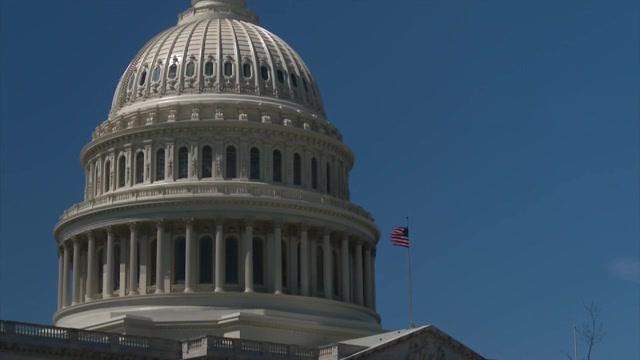WASHINGTON (AP) — President Donald Trump is calling on the Senate to scrap the filibuster so that the Republican majority can bypass Democrats and reopen the federal government.
“THE CHOICE IS CLEAR: INITIATE THE ‘NUCLEAR OPTION,’ GET RID OF THE FILIBUSTER,” Trump posted Thursday night on his social media site, Truth Social.
The filibuster is a long-standing tactic in the Senate used to delay or block votes on legislation by keeping the debate running. It requires 60 votes in a full Senate to overcome a filibuster, giving Democrats a check on the 53-seat Republican majority. This dynamic led to the start of the Oct. 1 shutdown when the new fiscal year began.
Trump’s call to terminate the filibuster could alter how the Senate and congressional dealmaking operate. The president said in his post that he gave a “great deal” of thought to the choice on his flight back from Asia on Thursday.
Trump spent the past week with foreign leaders in Malaysia, Japan, and South Korea, finishing his tour by meeting with Chinese leader Xi Jinping. The president declared the trip a success due to a trade truce with China and foreign investment planned for American industries. However, he said one question kept coming up during his time there: why did “powerful Republicans allow” the Democrats to shut down parts of the government?
His call to end the filibuster came at a moment when certain senators and House Speaker Mike Johnson believed it was time for the government shutdown to come to an end. It remains unclear if lawmakers will follow Trump’s lead or seek to negotiate with Democrats.
### Nationwide Impact of the Shutdown
From coast to coast, fallout from the dysfunction of a shuttered federal government is hitting home:
– Alaskans are stockpiling moose, caribou, and fish for winter, even before SNAP food aid is scheduled to shut off.
– Mainers are filling their home-heating oil tanks but are waiting on federal subsidies that have yet to arrive.
– Flights are being delayed with holiday travel around the corner.
– Workers are going without paychecks.
– Americans are getting a first glimpse of skyrocketing health care insurance costs, which are at the center of the stalemate on Capitol Hill.
“People are stressing,” said Sen. Lisa Murkowski of Alaska, as food options in her state grow scarce. “We are well past time to have this behind us.”
While quiet talks are underway—particularly among bipartisan senators—the shutdown is not expected to end before Saturday’s deadline. At that point, Americans’ deep food insecurity—one in eight people depend on the government to have enough to eat—could become starkly apparent if federal SNAP funds run dry.
### Military Funding vs. Food Aid
The White House has moved money around to ensure the military is paid but refuses to tap funds for food aid.
In fact, Trump’s “big, beautiful bill” signed into law this summer delivered the most substantial cut ever to the Supplemental Nutrition Assistance Program (SNAP), projected to result in some 2.4 million people being removed from the program.
At the same time, many Americans who purchase their own health insurance through federal and state marketplaces—with open enrollment also beginning Saturday—are experiencing sticker shock as premium prices jump.
“We are holding food over the heads of poor people so that we can take away their health care,” said Rev. Ryan Stoess during a prayer with religious leaders at the U.S. Capitol. “God help us,” he said, “when the cruelty is the point.”
### Deadlines Shift to Next Week
The House remains closed under Speaker Johnson for the past month. Senators are preparing to depart Thursday for the long weekend. Trump returns late Thursday after his whirlwind tour of Asia.
That means the shutdown, now in its 30th day, appears likely to stretch into another week if the filibuster remains.
If the shutdown continues, it could become the longest in history, surpassing the 35-day lapse that ended in 2019 during Trump’s first term, which occurred over his demands to build the U.S.-Mexico border wall.
The next inflection point comes after Tuesday’s off-year elections—including the New York City mayor’s race, as well as elections in Virginia and New Jersey that will determine those states’ governors. Many expect that once winners and losers are declared, and both the Democrats and Republicans assess their political standing with voters, they might be ready to hunker down for a deal.
“I hope that it frees people up to move forward with opening the government,” said Senate Majority Leader John Thune, R-S.D.
### GOP Defends Cuts Despite Shutdown Impact
The Republicans, who have majority control of Congress, find themselves in an unusual position—defending furloughed federal workers and shuttered programs they have long sought to cut. Most recently, they enacted nearly $1 trillion in reductions in Trump’s big tax breaks and spending bill.
Medicaid and SNAP food aid suffered sizable blows this summer, partly by imposing new work requirements. For SNAP recipients, many of whom were already required to work, the new requirements extend to older Americans up to age 64 and parents of older school-age children.
House Democratic Leader Hakeem Jeffries criticized Republicans for suggesting withholding food aid is a political strategy. “We are trying to lift up the quality of life for the American people,” Jeffries said. “The American people understand that there’s a Republican health care crisis. The American people understand Republicans enacted the largest cut to nutritional assistance in American history when they cut $186 billion from their one, big, ugly bill.”
During the summer debate over Trump’s big bill, Johnson and other Republicans railed against what they characterized as lazy Americans, riding what Johnson calls the “gravy train” of government benefits. The speaker spoke about able-bodied young men playing video games while receiving Medicaid benefits and insisted the new work requirements for aid programs would weed out what they called “waste, fraud, and abuse.”
“What we’re talking about, again, is able-bodied workers, many of whom are refusing to work because they’re gaming the system,” Johnson said in the spring on CBS’ *Face the Nation*. “And when we make them work, it’ll be better for everybody, a win-win-win for all,” he added.
### Health Care Costs and the Stalemate
What remains out of reach for now is any relief from the new health care prices posted this week, which are expected to put insurance out of reach for many Americans when federal subsidies that help offset those costs expire at the end of the year.
Democrats have been holding out for negotiations with Trump and Republicans to keep those subsidies in place. Republicans say they can address the issue later, once the government reopens.
—


